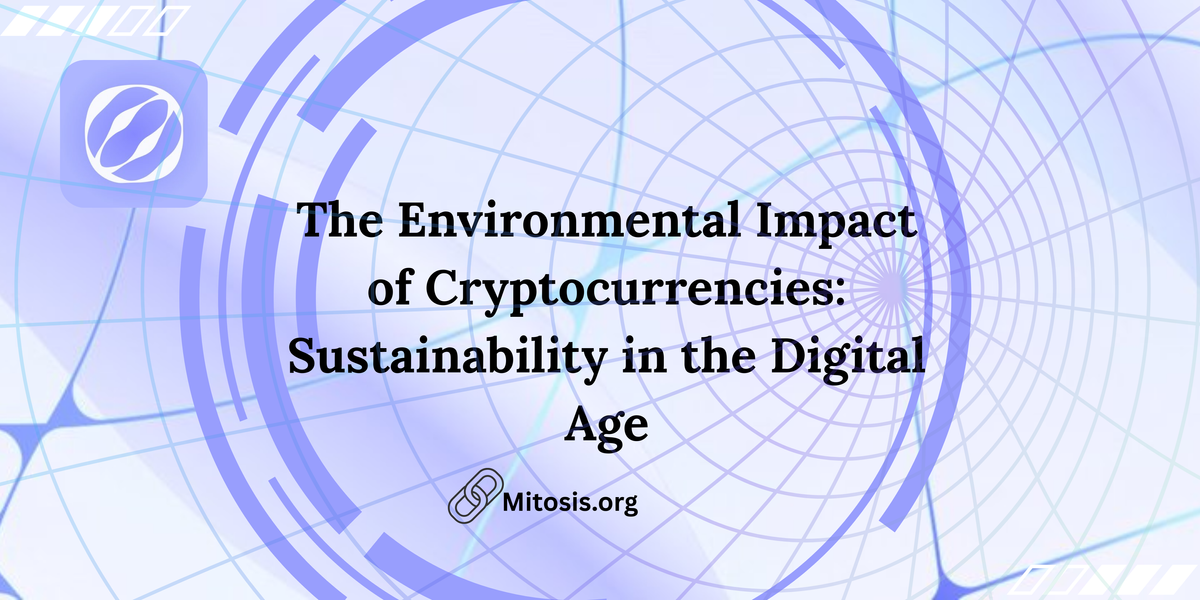The Environmental Impact of Cryptocurrencies: Sustainability in the Digital Age

As cryptocurrencies continue to reshape the financial space, their environmental footprint has become a pressing concern. The energy-intensive processes underpinning many digital assets, particularly those utilizing proof-of-work (PoW) consensus mechanisms, have sparked debates about sustainability and the future of blockchain technology.
The Energy Demands of Proof-of-Work
Bitcoin, the pioneering cryptocurrency, operates on a PoW system that requires miners to solve complex mathematical puzzles to validate transactions. This process consumes vast amounts of electricity, with estimates indicating that Bitcoin's annual energy consumption rivals that of entire countries. Such high energy usage contributes significantly to carbon emissions, raising environmental and ethical questions about the sustainability of PoW-based cryptocurrencies. See https://www.fnlondon.com/articles/bitcoin-falls-behind-ether-and-dogecoin-in-crypto-sustainability-dd48fa8b?


Transitioning to Energy-Efficient Models
In response to these concerns, the blockchain community has explored alternative consensus mechanisms. Proof-of-stake (PoS) has emerged as a viable solution, drastically reducing energy consumption by selecting validators based on the amount of cryptocurrency they hold and are willing to "stake" as collateral. Ethereum's transition to PoS in 2022, known as "The Merge," resulted in a reported 99.95% reduction in energy usage. This shift not only addresses environmental issues but also enhances scalability and security within the network. See https://www.investopedia.com/the-ethereum-merge-6504132?



Embracing Renewable Energy Sources
Beyond altering consensus mechanisms, integrating renewable energy into mining operations presents another avenue for reducing the environmental impact of cryptocurrencies. Some mining companies have begun utilizing solar, wind, and hydroelectric power to fuel their activities. For instance, mining farms in regions with abundant renewable resources, such as Iceland and Norway, have adopted cleaner energy practices, setting a precedent for sustainable mining operations worldwide. See https://www.investopedia.com/the-ethereum-merge-6504132?

Addressing Electronic Waste
The rapid obsolescence of mining hardware contributes to the growing issue of electronic waste (e-waste). Specialized equipment, like ASICs, often has a short lifespan, leading to significant amounts of discarded electronic components. Efforts to mitigate this problem include developing more durable hardware, promoting recycling programs, and encouraging the repurposing of outdated equipment to extend its usability. See https://www.baltictimes.com/environmental_impact_of_cryptocurrency_mining_and_sustainable_solutions/?

Mitosis: Pioneering Sustainable DeFi Solutions
In the decentralized finance (DeFi) sector, platforms like Mitosis are leading the charge toward environmentally conscious operations. By leveraging PoS mechanisms and focusing on efficient liquidity management, Mitosis minimizes energy consumption while maintaining robust financial services. Its innovative approach includes: See https://mitosis.org/manifesto
- Ecosystem-Owned Liquidity (EOL): A model that allows communities to collectively manage and deploy liquidity, reducing redundant resource usage.
- Matrix Vaults: Curated liquidity pools that optimize asset allocation across multiple chains, enhancing efficiency and reducing the need for energy-intensive cross-chain transactions. See https://university.mitosis.org/page/2/
These strategies exemplify how DeFi platforms can align financial innovation with environmental responsibility. See https://university.mitosis.org/glossary/
Conclusion
As the cryptocurrency industry matures, integrating sustainable practices becomes imperative. Transitioning to energy-efficient consensus mechanisms, adopting renewable energy sources, and addressing e-waste are critical steps toward minimizing the environmental impact of digital assets. Platforms like Mitosis demonstrate that it's possible to achieve financial innovation without compromising ecological integrity. By prioritizing sustainability, the crypto community can ensure that the digital revolution contributes positively to the planet's future.



Comments ()